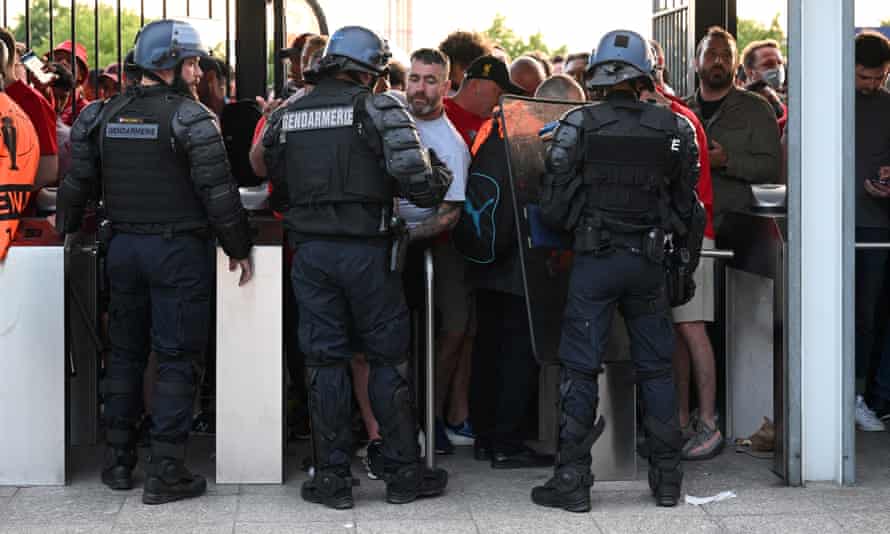Most senior Uefa security officials ‘not actively involved’ in Champions League final control room
The head of Uefa’s safety and security department and the senior safety official at the Champions League final were not actively involved in the Stade de France control centre as the night descended into chaos, it has been claimed.
Lower-ranking Uefa safety officers on duty at the Paris final between Liverpool and Real Madrid on 28 May are said to have worked frantically hard to try to remedy the dangerous developments and huge static queues outside the stadium. However, there have been reports from the operation that Zeljko Pavlica, Uefa’s head of safety and security, and the official delegated for senior Uefa responsibility at the match, said to have been Zoran Cvrk, were not visibly involved in the control centre.
A source with knowledge of events within the control centre has claimed that an official crisis meeting should have been called but was not and claimed that set protocols that would flow from it were not followed.
At major Uefa club and national-team finals, experts say that responsibility for safety at the stadium is delegated to a local organising team, and a safety officer experienced at that ground will take charge. Uefa delegates a senior official to liaise across the command team, with the ability to intervene if necessary. The control centre officers have official liaison with all bodies necessary to preserve safety and security at a major event, commonly including the police, medical, emergency and local authority representatives.
Although both senior Uefa officials may not necessarily be expected to be in the control room for long periods, sources have told the Guardian they expected them to make themselves visibly involved in the room as the situation deteriorated.
Uefa declined to comment, saying that all issues relating to the events in Paris will be considered by the “independent review” it has established. At this stage the actions taken by Pavlica, Cvrk or other Uefa officials as the situation deteriorated, whether in the control centre or elsewhere at the stadium, have yet to be fully established.
Liverpool and its supporters’ trust Spirit of Shankly have questioned the credibility and independence of Uefa’s review and its chairman, the Portuguese MP Tiago Brandão Rodrigues, and not so far accepted its suitability to thoroughly investigate the failures at the final. Liverpool are understood to have received approximately 9,000 testimonies from supporters who were at the match, and club officials are said to be increasingly convinced that another disaster causing death and serious injuries to their supporters was only narrowly avoided.
Although a major focus of any investigation will be the management of the Paris organisers and in particular the French police, Uefa’s own safety and security operation is coming under increasing scrutiny. Pavlica is subject to hardening claims about cronyism at Uefa, because he is a close friend of the organisation’s president, Aleksander Ceferin, from their native Slovenia, and under Ceferin’s presidency was given his first permanent Uefa job in 2016, then promoted to head the department last year. Uefa has denied claims of cronyism and said Pavlica was the “natural successor” when the previous head of department retired. Cvrk is said to be generally well-liked at Uefa; he is a former police and security officer in Croatia who was then security commissioner at the Croatian Football Federation for 10 years and joined Uefa full-time as a safety and security adviser in 2020.

While there are questions about the roles Pavlica and Cvrk played on the night, two more junior Uefa safety and security officials, Wayne Nash and Lukasz Nalewaj, are said by people at the ground to have been visibly working tirelessly and trying everything to rectify the deteriorating situation.
Arrangements at the final went catastrophically wrong after French police held thousands of Liverpool supporters in a bottleneck filter outside the stadium perimeter, apparently for ticket checks, but then gave up on it. That enabled local young people to approach the stadium directly, and many inserted themselves into queues of supporters at turnstiles which were then closed without explanation for long periods. Thousands of fans with tickets were barred from entering and teargassed by police.
Liverpool and their supporters continue to be incensed by the allegations made instantly on the night, that the delayed kick-off was caused by “late arrival of fans”, and that “thousands” of Liverpool fans had fake tickets. Neither the French government nor Uefa has yet retracted those claims.
Ian Byrne, a Liverpool MP and supporter who was at the final, said: “But for the exemplary behaviour of Liverpool supporters in horrific circumstances there could have been another huge catastrophe like the Hillsborough disaster, and that chills me to the core of my soul. It seems clear that Uefa were not capable of handling this match, and that is why we need a fully independent investigation.”
In response to questions about the control room operations Uefa said that it would provide all required information to its review, which it has said will examine the “decision making, responsibility and behaviours of all entities involved in the final”.
A spokesperson said: “Uefa will therefore wait for the independent report to be finalised before making any further comments on the matter.”
The Guardian asked via Uefa whether Pavlica and Cvrk wished to comment and received no response.
Subscribe To Our Newsletter
-
How to get a free jersey
- How to get Pcs free jerseys Feedback Customer Reviews About Us Contact Us News FAQ
-
User Center
- Forget Password My Orders Tracking Order My Account Register
-
Payment & Shipping
- Customs & Taxes Locations We Ship To Shipping Methods Payment Methods
-
Company Policies
- Return Policy Privacy Policy Terms of Use Infringement Policy

